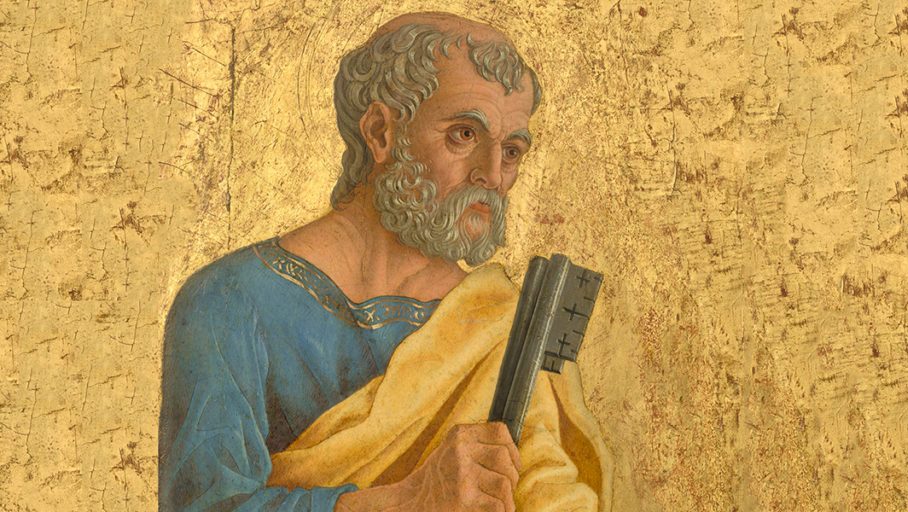God’s Steward
21st Sunday in Ordinary Time (Year A)
“You are Peter and upon this rock I will build my Church and the gates of the netherworld shall not prevail against it.”
Matthew 16:18
What is so special about the Pope? There are only three orders in the hierarchy of the Church — deacon, priest and bishop — not deacon, priest, bishop, and pope. The pope is the bishop of a diocese like any other bishop. He’s the Bishop of the Diocese of Rome. So why do we believe that he has special authority over and above that of other bishops? It has to do with what we read in this Sunday’s gospel.
First, though, we need to take a look at what’s happening in the first reading for this Sunday, from the prophet Isaiah. God, through Isaiah, is talking to someone named Shebna about someone else named Eliakim. Who are these people?
Shebna was the royal steward of the palace. A steward is someone who has been given an office to govern on behalf of someone else. A royal steward governs on behalf of the king. By nature of his office he has the authority to make binding decisions in the king’s name. The steward also has the responsibility to care for the kingdom and its subjects, just as the king would. A steward’s authority is real, but it is borrowed. The king can take it away and give it to another, and this is just what happens in this passage from Isaiah.
Shebna has been a bad steward. He’s been acting like a king instead of a caretaker (like Denethor in The Return of the King). He was even having a tomb for himself built in the place reserved for the royal sons of David.

So God sends Isaiah to tell Shebna that his time in office has come to an end. He will take a more righteous servant, a man named Eliakim, and place him in the office of steward instead. He says, “I will place the key of the House of David on Eliakim’s shoulder; when he opens, no one shall shut, when he shuts, no one shall open” (Is 22:22).
The key was a symbol of the steward’s office. “Opening and shutting” (or sometimes “binding and loosing”) was a common Hebrew phrase that referred to the authority to make binding decisions of interpretation of the law.
With this as background, we can better understand what’s going on in Matthew’s gospel. When Jesus asks the Apostles who they say that he is, Simon (not yet Peter) answers, “You are the Christ, the Son of the living God.” In response, Jesus tells Simon, “I say to you, you are Peter [meaning “rock”] and upon this rock I will build my church, and the gates of the netherworld shall not prevail against it” (Mt 16:18).
Then comes a part that strongly parallels the language we just heard from Isaiah: “I will give you the keys to the kingdom of heaven. Whatever you bind on earth shall be bound in heaven; and whatever you loose on earth shall be loosed in heaven” (Mt 16:19). Notice the mention of keys and of binding and loosing. Jesus just installed Simon as the steward of his kingdom and gave him a new name, Peter, to go along with his new office. That’s kind of a big deal, wouldn’t you think?
Jesus says that “the gates of the netherworld” (meaning the powers of death) will never prevail against his kingdom, the Church. That means the office of steward he establishes in Peter will not end when Peter dies. It lives on in his successors. Because the authority of the steward lies in the office, and not in the man, it passes on to any who hold that office. When Peter was martyred in the year 64 AD, he was the leader of the Church of Rome. Succeeding bishops of Rome — Linus, Cletus, Clement and so forth — shared in this Petrine Office of stewardship, governing and guiding the Church in the name of Jesus Christ.
Pope Francis is the 266th person to hold the office Christ established in Peter. Because of the promises made by Christ in the Gospel, Christians today continue to look to the Bishop of Rome as the principal steward of the faith and governor of the Church that Christ established, not because we have faith in the man in the office, but because we have faith in Christ who established the office for the good of the Church.

